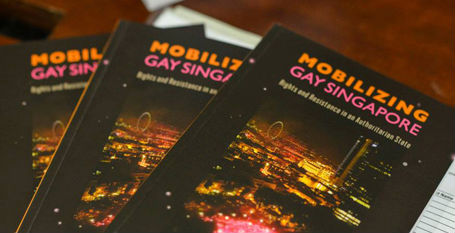Singapore is not a country known for liberal views on gay issues. Section 377A of its Penal Code, an inheritance from colonial times, still criminalizes homosexual acts, even private ones. Gay organizations are not permitted to register as NGOs and so any that exist are per se illegal. Any mention of, or portrayal of, homosexuality on large or small screen is liable to censorship. What freedom exists for LGBT people in Singapore is at the whim of a state which has announced, without any apparent shame, that it has the discretion not to implement the laws on its own statute book.
Yet Singapore is also a country of paradox. Since 2009, it has been the site of Pink Dot, a peaceful gathering in its Hong Lim Park, which has got around the state’s prohibition of political gatherings by presenting itself as a picnic for people who happen to be wearing pink. 26,000 LGBT people and their supporters turned up for the event in 2014, and it has become the prototype of similar events held in many other countries—Hong Kong held its first Pink Dot this year.
Singapore is also the home of a vibrant gay nightlife which can be enjoyed without police harassment. It has an arts scene which includes many prominent “out” gay activists, who regularly put on gay-themed productions, some of them sponsored by Government agencies. The Singapore Government money pays for its gay writers and artists to travel to foreign countries to perform and participate in cultural and LGBT events. As oppressions go, this is a very odd sort indeed.
The history of Singapore’s gay movement, by now very open, had not been told hitherto, but—as yet another sign of the changes afoot there—this has now been remedied by Lynette Chua in her new account Mobilizing Gay Singapore. Chua, a Malaysian academic working as an Assistant Professor in the Law Faculty of the National University of Singapore, has had her book published by her own university’s press. This will be quite a surprise to anyone who might have believed Singapore to be a country more likely to burn than publish such a work.
More surprising is the fact that the book shows no signs of any censorship. Chua has been allowed full rein to criticize the authoritarian nature of the Singaporean state. She is forthright in her views. A few quotes from her second chapter will suffice to indicate the bravery of her criticism:
... the PAP [People’s Action Party] government aggressively deploys its particular brand of rule of law, which is adherence to rules and procedures rather than the protection and vindication of rights and equality...
... to ensure its victorious return [at elections] and political monopoly, it [the PAP] imposes legal restrictions to curb civil-political liberties and political access.
In a society where the law is wielded for purposes of control, and where, as Chua posits, most citizens may link observation of the law with respectability, advancing LGBT rights would seem to pose insuperable problems. Chua shows, however, that even in Singapore, by “pushing boundaries” while “toeing the line”, incremental change is possible. In fact, the technique of “pragmatic resistance” has been so successful that it has prised open the closet door in a way unthinkable when the process began in the 1990s. Gay rights are now openly on the agenda, even if this has yet to be reflected in any changes in the law. As a result, many gay men and women have “come out” and have begun to express their views, although that itself has created the sort of right wing and fundamentalist Christian backlash we have come to expect in Hong Kong. Change, though over a long period, is in the wind, and so despite her focus on the oppression and difficulties that are still rampant in Singapore, Chua cannot but help end her book on an optimistic note.
Although a very welcome addition to the LGBT literature about South-East Asia, Mobilizing Gay Singapore is a short work of just under 170 pages, plus an academic apparatus. Chua naturally concentrates on the law and its effects, but that is no drawback, rather a highly appropriate lens.
Chua is neither a social scientist nor a political historian, something that shows in her methodology. She was educated in the United States and perhaps as a result her opening chapter is heavily influenced by “queer theory” in vogue there. She on whole succeeds in writing about it intelligibly and making some of it relevant to her Singapore theme, but by the second chapter her historical account leaves this mostly behind.
The political history that Chua chronicles in most of the book is not allowed to become over-theoretical or dry, as she includes accounts of personal experiences from the many hundreds of activists whom she has interviewed. However, in these she confuses the reader and muddies her account by referring to interviewees and organisations—even those long “out” and well-known in the Singapore media—by pseudonyms. This seems unnecessary, given that the police surveillance which she so clearly describes will have already made them all clear to the Singapore government. They are not clear to those of us not in the know, and this is frankly irritating. Chua is a very brave writer, but one who should have let her subjects speak out bravely, too.
That small point aside, Mobilizing Gay Singaporefills a void in foreigners’ understanding of gay issues in Singapore. It will remain for some time the standard work on the subject and is a very welcome addition to the LGBT canon.












 Printable Version
Printable Version




















Reader's Comments
Please log in to use this feature.